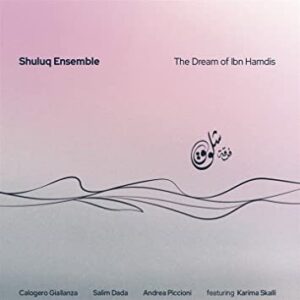
Het Shuluq Ensemble brengt een transparante mix van Oriëntaalse en Middelandse Zee-muziek met het album The Dream of Ibn Hamdis.
English version below
Middelandse Zee-muziek bestaat natuurlijk niet als een muziekstijl. Maar de Middelandse Zee is wel al jarenlang een ontmoetingsplaats van culturen uit de Orient en Noord Afrika. De handelsbetrekkingen tussen de diverse landen rond deze zee hebben ertoe geleid dat niet alleen goederen maar ook muziek werd verhandeld. Shuluq betekent zuidewind, ofwel sirocco. Een metafoor waarmee het Shuluq Ensemble de wind bedoelt over de-zee-tussen-de-landen-waar-deze-muziek-vandaan-komt. Het kwartet bestaat uit twee Italiaanse musici, een Algerijnse en een Marokkaanse zangeres. Naast één Algerijns traditioneel stuk spelen ze verder eigen werk op dit album. De stukken zijn over het algemeen plechtig en solemneel van kleur. Bijzonder is het openingswerk Mnajdra, een ode aan het eiland Malta. In het daarop volgende stuk Behind the Sea horen we de soepele vocalen van zangeres Karima Skalli in een gedicht van Ibn Hamdis (Siciliaans/Arabische dichter uit de 12de eeuw). Een loflied voor Sicilië waarin zij zingt over gedwongen deportatie. Maremossa is een ode aan de zee: aan de betrouwbaarheid van het water dat zowel kalm als stormachtig kan zijn. Het stuk wordt voortreffelijk gespeeld door percussionist Andrea Piccioni, met Calogero Giallanza op bas-fluit en gitarist Salim Dada. Een ode aan de lente horen we in Istikhbar. Een solo-werk van Salim Dada, gespeeld op de Algerijnse kwitra waarin hij de compositie een verhalend karakter meegeeft. Een rustgevende oase. Het slotstuk is het Arab-Andalusisch lied Nwaiba Skallia. Hierin horen we het hele kwartet in een lied over een gebroken hart.
Het Shuluq Ensemble werd opgericht door de Sicilaanse musicus Calogero Giallanza, die naast fluitist ook componist is. De Italiaan Andrea Piccioni is een grootmeester op de frame-drum en docent aan het Termini Imerese Conservatorium. De Algerijnse musicus Salim Dada speelt naast gitaar de kwitra, de Algerijnse luit die veel wordt gebruikt bij de Arab-Andalusische muziek. Ook hij is componist en schreef meer dan 100 symfonische werken, kamer- en filmmuziek. Tenslotte zangeres Karima Skalli (foto) is de overtuigende ambassadeur van de Marokkaanse muziek. Zij werkte o.a. voor het Arab Music Festival, de Cairo Opera Conference en het religieuze festival in Fez. The Dream of Ibn Hamdis is een betoverend album waarmee het Shuluq Ensemble een weids spectrum etaleert. De inspiratie voor een brede muzikale verbeelding!
English version
The Shuluq Ensemble presents a transparent mix of Oriental and Mediterranean music with the album The Dream of Ibn Hamdis.
As a musical style Mediterranean music doesn’t exist, of course. But the Mediterranean Sea has been a meeting place of cultures from the Orient and North Africa for many years. The trade relations between the various countries around this sea resulted not only in trading but also for mixing music. Shuluq means south wind, or sirocco. A metaphor by which the Shuluq Ensemble means the wind above the-sea-between-the-countries-where-this-music-comes-from. The quartet consists of two Italian musicians, an Algerian and a Moroccan singer. In addition to one Algerian traditional, they play their own work on this album. The pieces are generally solemn and majestic in colour. The opening piece Mnajdra is very special. It’s an ode to the island of Malta in a long and slow composition. In the following piece Behind the Sea we hear the smooth vocals of singer Karima Skalli in a poem by Ibn Hamdis (Sicilian/Arabic poet from the 12th century). A song of praise for Sicily in which she sings about forced deportation. Maremossa is an ode to the sea: to the reliability of the water that can be both calm and stormy. The piece is superbly played by percussionist Andrea Piccioni, with Calogero Giallanza on bass-flute and guitarist Salim Dada. We hear an ode to spring time in Istikhbar. A solo work by Salim Dada, wonderful played on the Algerian kwitra in which he gives the composition a narrative character. A restful composition like an oasis. The closing piece is the Arab-Andulusian song Nwaiba Skallia. In this we hear the entire quartet in a song about a broken heart.
The Shuluq Ensemble was founded by the Sicilian musician Calogero Giallanza, who is also a composer in addition to being a flutist. The Italian Andrea Piccioni is a grand master of the frame drum and teacher at the Termini Imerese Conservatory. In addition to the guitar, the Algerian musician Salim Dada plays the kwitra, the Algerian lute that is often used in Arab-Andulusian music. He is also a composer of more than 100 symphonic works, chamber and film music. Finally, singer Karima Skalli (photo) is the convincing ambassador of Moroccan music. She has worked for the Arab Music Festival, The Cairo Opera Conference and the religious festival in Fez, among others. The Dream of Ibn Hamdis is an enchanting album with which the Shuluq Ensemble displays a wide spectrum. The inspiration for a broad musical imagination!
- Shuluq Ensemble: The Dream of Ibn Hamdis (VisAge / Xango)
© Mattie Poels.

Geen reacties